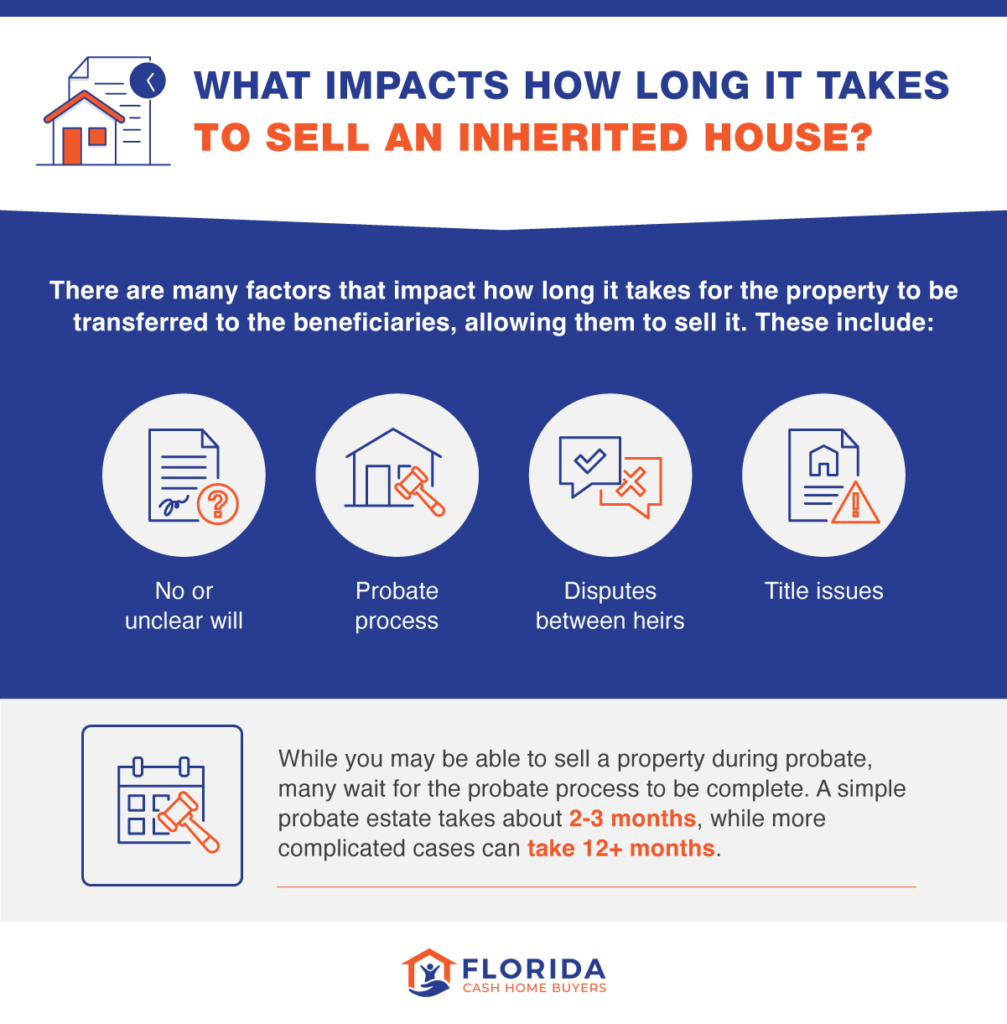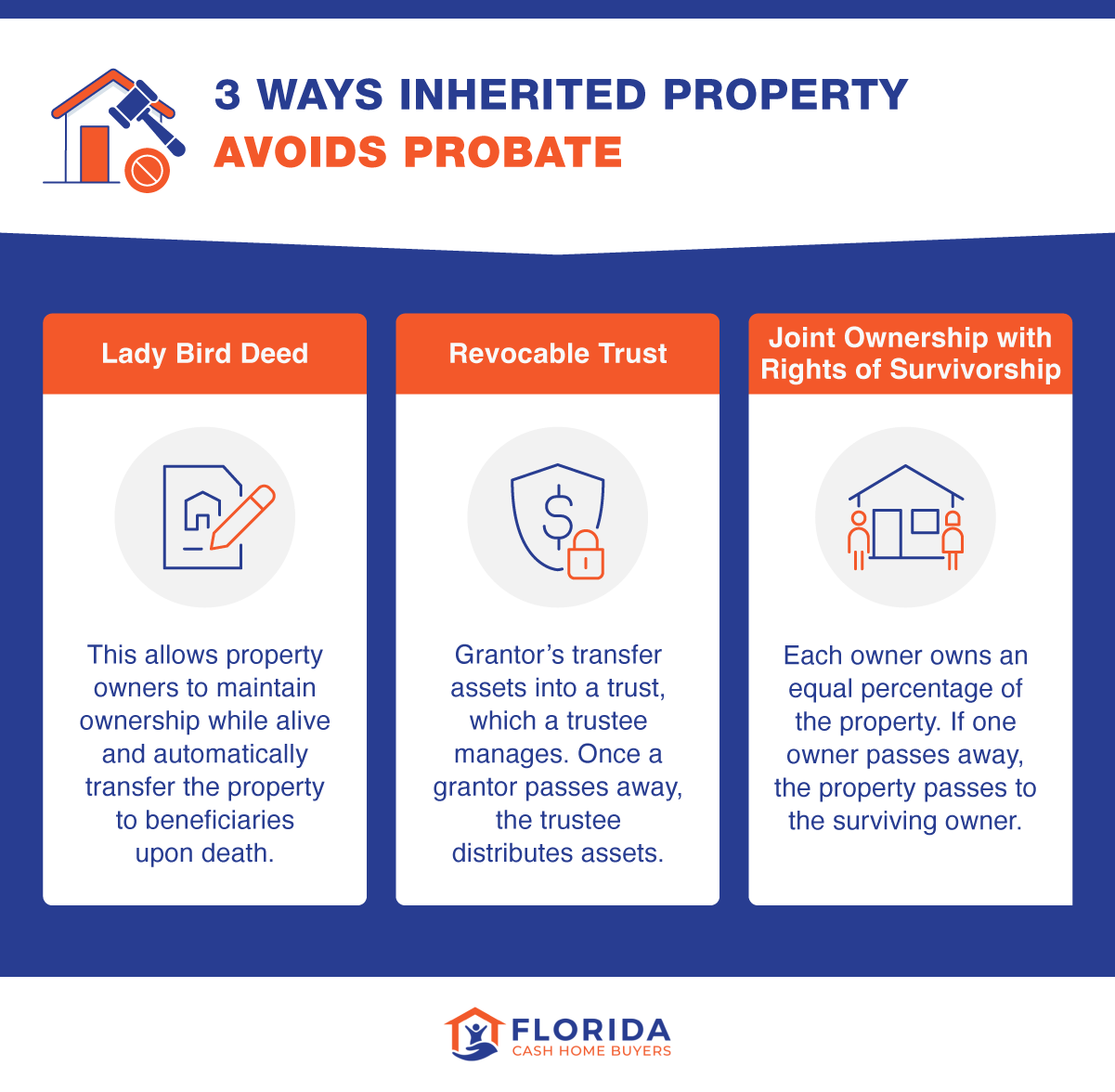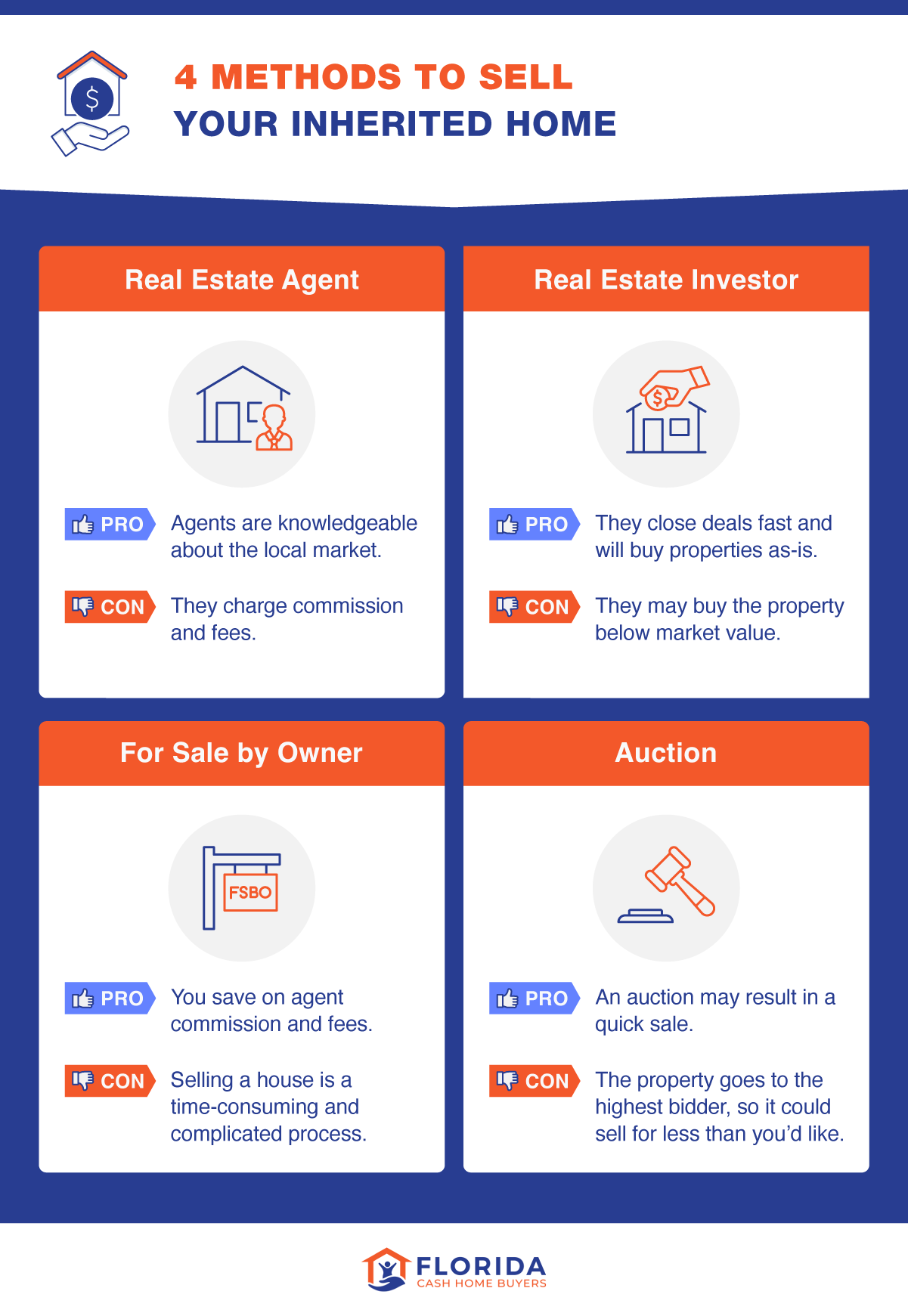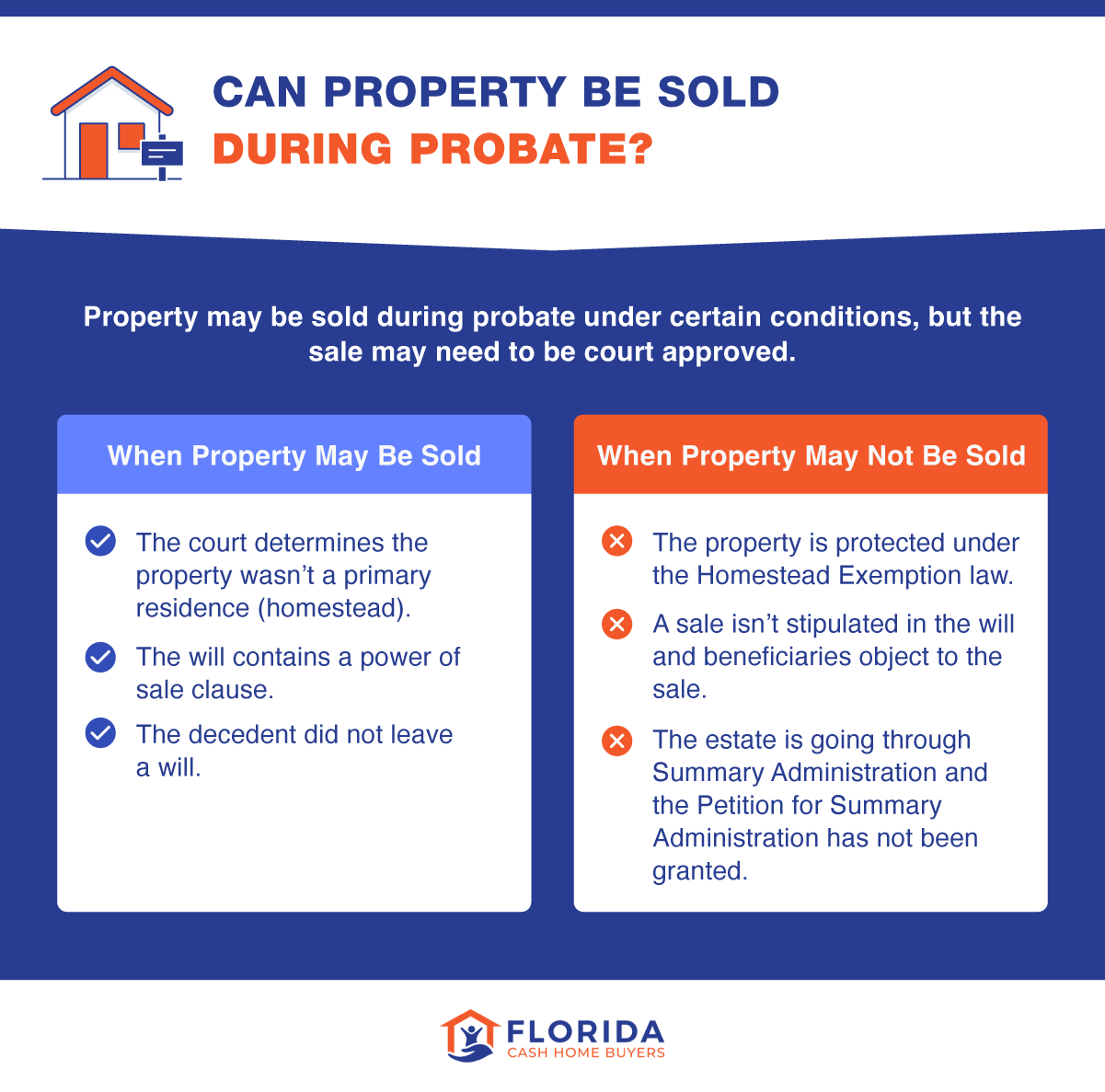If you’re considering selling an inherited house in Florida, the process will depend on how you inherited it (probate vs. probate-free methods), whether the title is clear and if all heirs agree. This guide walks you through everything you need to know, from probate and paperwork, to taxes and selling options.
And if you’re feeling stuck, we might be able to help. Florida Cash Home Buyers is an expert at navigating probate and can work with you to buy your home for cash. Contact us today to see how we can help.
Key Takeaways: What You Need to Know About Selling an Inherited House in Florida
- Probate is usually required if the home was in the deceased’s name only.
- Ways to avoid probate include a Lady Bird Deed, revocable trust or joint ownership with rights of survivorship.
- You’ll need key documents including the death certificate, proof of ownership and the title report.
- All heirs typically must agree to sell unless a court orders a sale through partition.
- Taxes may apply. You may need to pay capital gains, prorated property taxes, documentary stamp tax for deed transfer, depreciation recapture (if the property was a rental) and possibly federal estate tax for large estates.
- Selling options include traditional listing with a realtor, FSBO, cash home buyer or auction.
How Long Does It Take to Sell an Inherited House in Florida?
If the property goes through probate, it can take 6 to 12 months or more to sell the property.
The probate process takes at least five to six months before the title can be transferred, including a three-month creditor claim period that’s required for all probate. In more complex cases, like if the estate needs to file a federal tax return, the will is contested or there is no will, probate can take 12 months or more.
Once the title is in your name, you’ll have the most flexibility with how you can sell the house. However, some situations allow home sales during probate, and we explain those below.

How to Sell an Inherited House in Florida
The process for selling an inherited house depends on if it was a primary residence, how much the home is valued at and if any estate planning tools were used. These steps will help you classify your property and determine the necessary route to sell it.
1. Know When Probate Isn’t Required
In Florida, not every inherited property has to go through probate. Certain estate planning tools allow ownership to transfer automatically upon death, giving heirs the legal authority to sell right away:
- Lady Bird Deed (Enhanced Life Estate Deed): The original owner keeps full control during lifetime, but property passes automatically to named beneficiaries at death. Since title transfers automatically, the new owners can list and sell the home as soon as they record the death certificate in county records.
- Revocable Trust: If the home was placed in a living trust, the trustee already has authority and can sell the home immediately without court involvement.
- Joint Ownership with Rights of Survivorship: When property is owned jointly with survivorship rights, the deceased person’s share automatically transfers to the surviving owner(s). Once the death certificate is recorded, the surviving owner has clear title and can move forward with a sale.
If probate isn’t required, you can generally sell the property as soon as ownership records are updated and the title is confirmed free of liens. In that case, skip ahead to Step 4 for selling options.
If the property was left to family members in a will (or with no will at all), probate is required before you can sell.

2. Determine Which Type of Probate You’ll Proceed With
If the deceased owned the property in their name alone, the estate must go through probate before you can sell. Probate validates the will (if one exists), appoints a personal representative (executor) and ensures debts and taxes are paid before distributing assets.
There are two primary types of probate:
- Summary Administration: This is a simplified process if the estate is valued under $75,000 (excluding the primary residence) or if the decedent has been dead more than two years. It can take as little as 4 to 6 weeks.
- Formal Administration: This is the standard probate process, typically lasting 6 to 12 months or more for complex estates.
If there’s no will, assets are distributed according to Florida’s intestacy laws, and the court oversees the process to ensure creditors are paid before heirs receive their shares.
Because probate can be complex, most families choose to work with a Florida probate attorney. They’ll determine the correct probate type, prepare and file petitions and guide you through the necessary court proceedings. Florida Cash Home Buyers partners with reputable probate attorneys that can help you through the probate process if you choose to sell your home to us for cash.
3. File for Probate
Once you’ve determined that probate is required and identified whether it will be summary administration or formal administration, the next step is to file (or have your lawyer file) with the probate court.
This begins with submitting a certified copy of the death certificate, the original last will and testament, an affidavit of heirs and the necessary petitions to open administration. The court reviews these filings to confirm everything in order.
- In formal administration, the court will issue Letters of Administration to the personal representative, giving them authority to act on behalf of the estate.
- In summary administration, the court issues an Order of Summary Administration, which distributes assets more quickly to the rightful heirs.
Before the property can be sold, the estate’s debts and creditor claims typically need to be addressed. In a formal administration, the personal representative must notify creditors, review claims, and ensure valid debts are paid or resolved before assets can be distributed or sold. In a summary administration, this process is streamlined, but creditors may still have rights depending on the situation.
Once these steps are complete and the court’s orders are in place, the personal representative has the legal authority to move forward with selling the property. However, a few exceptions allow a home sale during probate, which we outline below.
4. Choose How to Sell Your Property
After you obtain legal authority to sell, your next step is deciding how to market and close the sale. Your main options include:
- List with a real estate agent: This maximizes exposure and sale price, but you’ll pay 5% to 6% in commissions and it may take longer to close.
- Sell to a cash home buyer: This is the fastest and least complicated route. A cash home buyer like Florida Cash Home Buyers will purchase the home as-is, cover most of the costs and close in days to weeks.
- For sale by owner (FSBO): You can choose to sell the home yourself and save on the listing commission, but you’ll need to handle pricing, marketing, negotiations and paperwork yourself.
- Auction: Auctions allow you to sell fast. The highest bidder wins, but you risk the property selling for less than its fair market value.
After a property sale is complete, you’ve passed the creditor claim period (90 days) and debts and probate fees have been paid, money from the sale is distributed to beneficiaries. Before the 90 days are up, funds from the sale are typically held in either a court-restricted account or the petitioning attorney’s account until they can be legally disbursed.

When a Home May (or May Not) Be Sold During Probate
In some situations, a personal representative — a court-appointed person, bank or trust company who handles the estate — may be able to sell a home during probate, if it’s determined to be in the best interest of the estate.

The ability to sell a home during probate depends on several factors, including the type of probate administration, the instructions in the will (if one exists) and whether the sale is necessary to pay the estate’s debts.
If you’re considering selling your inherited home during probate, weigh the pros and cons and consult with a seasoned probate attorney. Even if you or the personal representative can find a buyer, the court may need to approve the sale.
When a Home May Be Sold During Probate
Here are the main circumstances that allow the sale of a home during probate.
- The court determines it’s not a homestead property. Homestead properties in Florida are generally protected from creditors and usually pass directly to heirs, meaning they cannot be sold to satisfy debts. However, if the property is not considered homestead, it may be sold to pay debts or distributed among beneficiaries. Creditors have three months from the date of notice to file claims, which is one reason probate can take so long.
- The will contains a power of sale clause. Florida Probate Code 733.613 gives a personal representative authority to handle estate transactions. If the will specifically includes a power of sale clause, the personal representative can sell the property without first seeking court approval.
- The decedent did not have a will (intestate). If there is no will, the court appoints a personal representative to manage the estate. They may sell the home during probate, but court approval is required before the sale can proceed.
When a Home May Not Be Sold During Probate
In these situations, a home cannot be sold during probate.
- The Homestead Exemption law applies. In Florida, a primary residence (homestead property) is protected from most creditors’ claims. Creditors cannot force the sale of a homestead property to satisfy debts, and the property typically passes directly to the heirs or surviving spouse instead of being sold to pay estate obligations.
- The beneficiaries object. If there isn’t a reason to sell the house, like paying off debts, and the beneficiaries object to the sale, the court may not approve the sale during probate.
- A petition for Summary Administration has not been granted. Until the court grants the Petition for Summary Administration, the property cannot be sold. Once approved, the court issues an order distributing assets to the rightful heirs. Only then can the heirs, not the personal representative, sell the property.
Remember, every situation is unique. It’s best to consult a probate attorney to understand your options.
Documents Required to Sell an Inherited House in Florida
While a probate attorney and real estate agent will help walk you through each process and guide you through the required documentation, it’s helpful to have a general idea of what’s required so that you can prepare. Common documents for probate and the sale of an inherited property include:
- Core probate documents: Death certificate; will (if any); affidavit of heirs; Letters of Administration or Order of Summary Administration
- Property and Title Documents: Deed; title report; mortgage payoff; HOA estoppel certificate (if applicable)
- Disclosures: Property condition disclosure; lead-based paint disclosure (if pre-1978); radon disclosure; HOA rules/dues.
- Supporting records: Property tax bill; receipts for repairs; utility bills
Do All Heirs Have to Agree to Sell the Property?
Generally, co-heirs must make joint decisions about selling, from setting the price to accepting an offer. But if heirs can’t agree, there are alternatives:
- Partition lawsuit: A co-owner can ask the court to force a sale or division of property through a partition lawsuit. In this case, the court (not the heirs) controls the process and appoints someone to handle the sale.
- Buyout option: An heir can sell their interest to another heir.
Taxes on the Sale of an Inherited Home
Florida does not have a state inheritance tax or estate tax, but federal taxes may apply depending on your situation. Always consult a tax advisor for guidance specific to your case.
| Tax | When It Applies | Rate / Amount | Who Pays |
|---|---|---|---|
| Federal capital gains tax | If the home sells for more than the cost basis | 0%, 15%, or 20% based on income bracket (long-term rates only) | Heirs on profit from sale |
| Property taxes | Ongoing until sale closes | Based on county rate | Prorated between seller and buyer at closing |
| Florida documentary stamp tax | Any deed transfer | $0.70 per $100 (0.7%) of sale price; $0.60 in Miami-Dade | Sellers at closing |
| Depreciation recapture tax | If property was a rental or depreciated for business | Up to 25% of depreciation claimed | Heirs at sale |
| Federal estate tax | Only for estates over $13.99M (2025) | Progressive, up to 40% | Estate (before heirs receive assets) |
Federal Capital Gains Tax
When you inherit a property, the IRS sets its value at the “stepped-up basis,” which is the fair market value on the date of the previous owner’s death. If you sell the property for more than the value of the home, the difference is considered a taxable capital gain. Selling costs (commissions, closing costs and improvements) can be deducted to lower taxable gains.
- Inherited property is always taxed as long-term capital gain, even if you sell it immediately after inheriting. This is significant because long-term gains are taxed at lower preferential rates — 0%, 15%, or 20% depending on your income bracket.
- If you live in the home for two out of the last five years, you’re eligible for a primary residence tax exclusion. You may exclude up to $250,000 of gains (single filer) or $500,000 (married couple) from taxation.
Property Tax
Property taxes continue to accrue after inheritance and must be paid until the sale closes.
- At closing, property taxes are usually prorated between seller and buyer based on the transfer date.
- If the deceased owner had unpaid property taxes, those must be settled before closing.
Florida Documentary Stamp Tax (Transfer Tax)
Florida charges a documentary stamp tax whenever a deed is recorded, including inherited property sales.
- The rate is $0.70 per $100 of the property’s value (0.7%) in most counties, and $0.60 per $100 in Miami-Dade.
Estate Tax
Florida has no estate tax, but the federal estate tax applies to very large estates.
- For 2025, the exemption threshold is $13.99 million.
- If the estate is valued above this threshold, the executor is required to file an estate tax return (IRS Form 706) within nine months of the date of death.
The estate tax is paid by the estate before heirs receive assets, so while it doesn’t directly impact the sale of an inherited property, it can impact overall inheritance.
Depreciation Recapture Tax
If the inherited home was ever used as a rental or for business purposes and depreciation was claimed, you may owe depreciation recapture tax when you sell.
- This tax applies to the portion of the gain equal to depreciation deductions already taken.
- Depreciation recapture is taxed as ordinary income, up to a maximum rate of 25%.
Florida Cash Home Buyers Make the Selling Process Stress-Free
Navigating the probate and sale process can feel intimidating, but we’re here to help. Florida Cash Home Buyers have helped many homeowners navigate probate with the help of trusted lawyers. If you want to get a cash offer or simply want to understand your options, contact us today!


